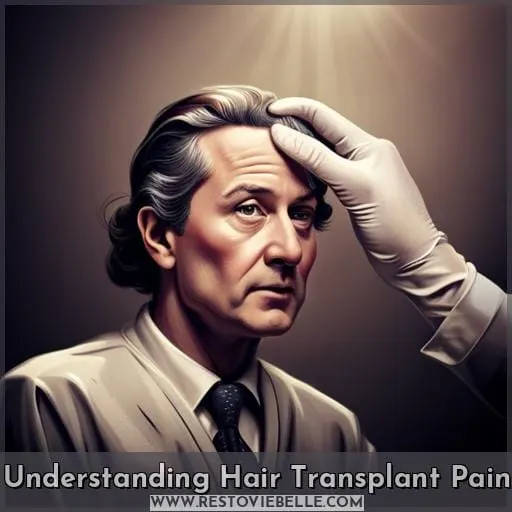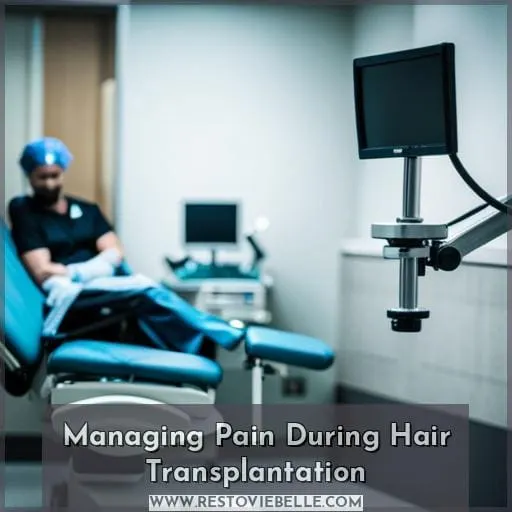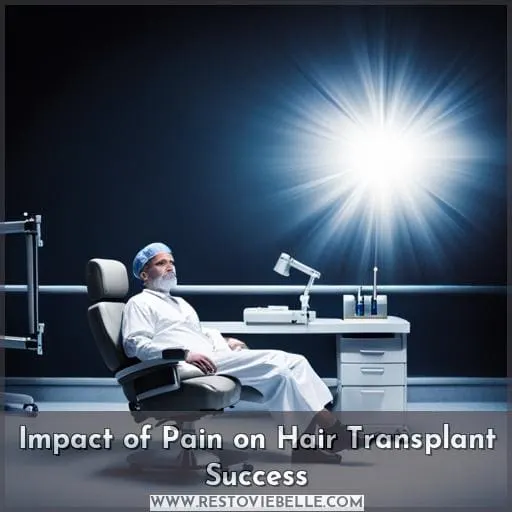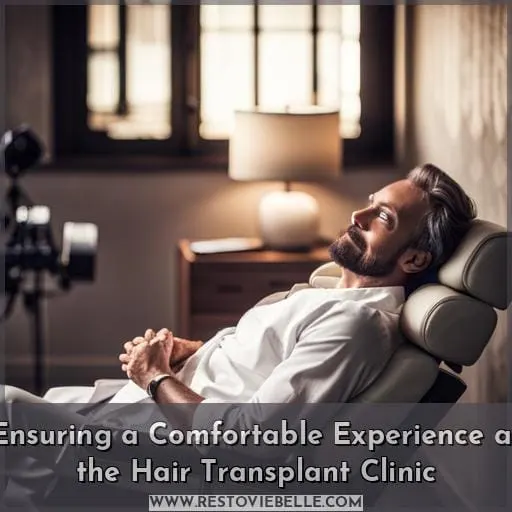This site is supported by our readers. We may earn a commission, at no cost to you, if you purchase through links.
 Imagine finally getting the full head of hair you’ve always dreamed of, without any pain or discomfort. With advancements in technology and techniques, hair transplants have become a popular solution for those dealing with hair loss.
Imagine finally getting the full head of hair you’ve always dreamed of, without any pain or discomfort. With advancements in technology and techniques, hair transplants have become a popular solution for those dealing with hair loss.
Contrary to what you may think, undergoing a hair transplant doesn’t have to be painful. In this article, we will explore the various methods used to manage pain during and after the procedure so that you can make an informed decision about whether a hair transplant is right for you.
Table Of Contents
- Key Takeaways
- Understanding Hair Transplant Pain
- Managing Pain During Hair Transplantation
- Pain Relief After Hair Transplant Surgery
- Impact of Pain on Hair Transplant Success
- Reporting Prolonged Pain to the Surgeon
- Ensuring a Comfortable Experience at the Hair Transplant Clinic
- Book a Consultation at the Hair Transplant Clinic
- Frequently Asked Questions (FAQs)
- How long does the numbing effect from local anesthesia last during a hair transplant surgery?
- Are there any alternative pain management techniques used during hair transplant surgery?
- Can patients choose the type of pain relief medication they receive after the surgery?
- What steps are taken to ensure patient comfort during the hair transplant procedure?
- How soon after the surgery should patients expect to be pain-free?
- Conclusion
Key Takeaways
- Local anesthesia injections numb the scalp during hair transplant surgery.
- A combination of pain relief medications and local anesthesia minimizes discomfort for patients.
- Specialized clinics prioritize patient comfort through techniques such as aromatherapy and entertainment options.
- Open communication with the surgeon is crucial for managing pain and ensuring a smooth recovery.
Understanding Hair Transplant Pain
Understanding hair transplant pain involves considering the administration of local anesthesia and the use of pain relief medications.
Local anesthesia is used during hair transplant procedures to numb the scalp, ensuring patients don’t feel any pain during surgery.
In addition, surgeons provide patients with pain-relieving medications to further reduce discomfort and promote relaxation throughout the procedure.
By utilizing these techniques, hair transplant surgeries can be relatively comfortable experiences for patients.
Local Anesthesia Administration
When you undergo a hair transplant, the first step in managing pain is through the administration of local anesthesia. This ensures that your scalp is numb during the procedure, minimizing any discomfort you may experience.
Here’s how local anesthesia works to provide pain relief and enhance patient comfort:
- Local Anesthesia Injections: Fine needles are used to inject small amounts of anesthetic into your scalp.
- Numbing Effect: Once injected, the anesthesia numbs your entire scalp so that you don’t feel any pain during surgery.
- Additional Comfort Measures: To further enhance patient comfort, techniques like aromatherapy and entertainment options such as music or films are provided.
By using local anesthesia and implementing other comfort measures, hair transplant clinics strive to create a relaxing environment where patients can have a comfortable experience throughout their procedure.
Pain Relief Medications
To alleviate any discomfort during a hair transplant procedure, the surgeon will administer pain relief medications to ensure your comfort throughout the process.
These medications are specifically designed to manage and reduce any potential pain or discomfort you may experience.
By combining these pain relief medications with local anesthesia techniques, surgeons can effectively minimize any unpleasant sensations during the surgery, ensuring a more comfortable experience for patients.
Managing Pain During Hair Transplantation
To ensure your comfort during a hair transplant procedure, various techniques are employed.
- Local anesthesia injections are used to numb the scalp and prevent pain throughout the surgery.
- Additionally, distractions such as music and aromatherapy help create a relaxing environment.
- You’ll have access to entertainment options like music, podcasts, TV shows, or films to further enhance your experience.
Techniques for Patient Comfort
You will frequently experience a comfortable and pain-free hair transplant procedure through various techniques implemented for your comfort.
Surgeons prioritize patient comfort by utilizing local anesthesia to numb the scalp, ensuring you don’t feel any pain during the surgical procedure.
In addition to numbing injections, entertainment options like music, podcasts, TV shows, and films are available to keep you relaxed throughout the surgery.
Entertainment Options
During the hair transplantation procedure, you can enjoy various entertainment options to help manage any discomfort.
To ensure patient comfort and relaxation, clinics offer a range of entertainment choices such as music, podcasts, TV shows, and films. These distractions not only provide a pleasant experience but also aid in pain management during the surgery.
By engaging in these relaxation techniques, you can enhance your overall level of patient comfort throughout the hair transplant procedure.
Pain Relief After Hair Transplant Surgery
After your hair transplant surgery, pain relief options will be available to ensure your comfort during the recovery process.
Your surgeon may prescribe pain medication such as paracetamol or ibuprofen to manage any post-operative discomfort. It’s important to follow their instructions and take the medication as directed for optimal pain relief.
Additionally, you can expect a gradual decrease in discomfort within a few days after the procedure, with most patients reporting minimal or no pain by that time.
Use of Painkillers
After your hair transplant surgery, you’ll be provided with painkillers to help manage any discomfort.
These pain relief medications are prescribed by the surgeon and can effectively alleviate post-operative pain.
The use of painkillers, along with proper aftercare instructions from your surgeon, contributes to a smooth recovery timeline and increases the success factors of the hair restoration procedure.
Open communication with your surgeon is essential for managing any discomfort throughout this process.
Expected Recovery Timeline
Once the initial pain relief medication wears off, you may experience some discomfort during the recovery period following your hair transplant surgery.
It’s important to understand what to expect during this time and how to manage any pain or discomfort that arises.
Recovery duration can vary depending on individual factors, but typically most patients are pain-free within 2 days after the surgery.
Impact of Pain on Hair Transplant Success
To ensure the success of your hair transplant, it’s crucial to understand the impact that pain can have on the outcome.
Pain management plays a significant role in patient comfort and overall satisfaction with the procedure.
Effective pain relief techniques not only help patients feel more at ease during surgery but also contribute to a smoother recovery timeline.
By providing adequate pain relief medications and employing various techniques for patient comfort, such as aromatherapy and entertainment options, surgeons strive to minimize discomfort throughout the hair transplant process.
It’s important to communicate any prolonged or persistent pain after surgery with your surgeon so they can address any potential issues promptly.
A comfortable experience at a specialized clinic that prioritizes patient comfort further enhances hair transplant success factors.
Reporting Prolonged Pain to the Surgeon
If you experience prolonged pain following your hair transplant, it’s important to promptly report it to your surgeon.
While some discomfort and mild pain can be expected during the recovery period, any persistent or severe pain shouldn’t be ignored.
Open communication with your surgeon is crucial in ensuring a smooth recovery process. By reporting prolonged pain, you allow the surgeon to assess and address any underlying issues that may be causing the discomfort.
They can provide appropriate guidance on managing pain through medication or other techniques for optimal patient comfort.
Remember that every individual’s recovery timeline may vary, but if you’re experiencing excessive or prolonged pain beyond what was initially discussed with your surgeon, don’t hesitate to reach out for support and assistance in managing it effectively.
Ensuring a Comfortable Experience at the Hair Transplant Clinic
When it comes to undergoing a hair transplant, ensuring a comfortable experience is essential.
At our specialized hair transplant clinic, we prioritize patient comfort and relaxation throughout the entire process.
Our goal is to create a welcoming environment that promotes relaxation and minimizes any potential discomfort during your procedure.
From providing amenities such as calming music and entertainment options to offering pain relief medications as needed, we strive to ensure that your experience at our clinic is as comfortable as possible.
Specialized and Comfortable Environment
You will experience a specialized and comfortable environment at the hair transplant clinic, ensuring a pleasant and relaxing experience.
- Comfortable atmosphere: The clinic is designed to create a soothing ambiance for patients.
- Patient relaxation: Techniques such as aromatherapy and calming music are used to help patients relax during the procedure.
- Clinic ambiance: The clinic is custom-built with patient comfort in mind, providing a serene and welcoming space.
- Specialized care: Surgeons focus on individualized care to meet each patient’s unique needs, ensuring an enhanced experience.
Focus on Patient Comfort and Relaxation
At our hair transplant clinic, we prioritize the comfort and relaxation of every patient. We understand that a pleasant experience can contribute to better outcomes and overall satisfaction.
To ensure optimal patient comfort, we employ various relaxation techniques such as aromatherapy and soothing music during the procedure. Our dedicated team also maintains open communication with patients to address any concerns or discomfort throughout their recovery timeline.
| Techniques for Patient Comfort | Entertainment Options | Surgeon Communication |
|---|---|---|
| Aromatherapy | Music | Open dialogue |
| Soothing music | Podcasts | Regular check-ins |
Book a Consultation at the Hair Transplant Clinic
To start your hair transplant journey, schedule a consultation at the hair transplant clinic.
A pre-surgery consultation is an essential step in the process as it allows you to discuss your concerns, goals, and expectations with a qualified surgeon.
During this initial meeting, you’ll have the opportunity to learn more about the clinic facilities and get acquainted with their team of professionals.
The consultation process typically involves a thorough examination of your scalp and discussion of various treatment options available to address your specific needs.
The surgeon will explain procedure details such as whether FUT or FUE is recommended for you based on factors like donor area availability and desired results.
By booking a consultation at the hair transplant clinic, you can gather all necessary information before making an informed decision about moving forward with the procedure.
Frequently Asked Questions (FAQs)
How long does the numbing effect from local anesthesia last during a hair transplant surgery?
The numbing effect from local anesthesia during a hair transplant surgery typically lasts around 3 hours. This ensures that you remain comfortable and pain-free throughout the procedure, allowing for a smooth and efficient process.
Are there any alternative pain management techniques used during hair transplant surgery?
During hair transplant surgery, alternative pain management techniques may be used in addition to local anesthesia.
These can include:
- Distractions like music or aromatherapy, as well as pain relief medications to ensure a comfortable experience for patients.
Can patients choose the type of pain relief medication they receive after the surgery?
Patients have the option to choose their pain relief medication after hair transplant surgery.
Surgeons provide recommendations based on individual needs and may prescribe medications such as paracetamol or ibuprofen for pain management.
What steps are taken to ensure patient comfort during the hair transplant procedure?
During a hair transplant, steps are taken to ensure your comfort.
The scalp is numbed using local anesthesia injections, and additional techniques like aromatherapy and music help relax you during the procedure.
How soon after the surgery should patients expect to be pain-free?
Patients can expect to be pain-free within 2 days after a hair transplant surgery.
Surgeons provide pain relief medications and use techniques like aromatherapy and music to ensure patient comfort during and after the procedure.
Conclusion
To put your fears to rest, hair transplants aren’t painful. Thanks to advancements in technology and pain management techniques, the procedure can be performed with minimal discomfort.
Local anesthesia is administered to numb the scalp during the surgery, and pain relief medications are provided afterward to manage any potential discomfort.
Additionally, hair transplant clinics prioritize patient comfort and provide a specialized and comfortable environment.
So, if you’re considering a hair transplant to achieve the full head of hair you’ve always wanted, rest assured that the process is designed to be as pain-free as possible.












